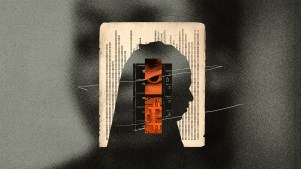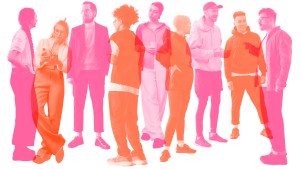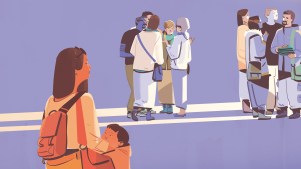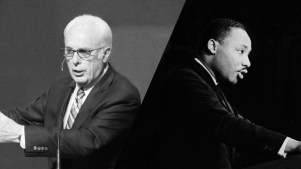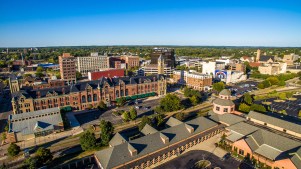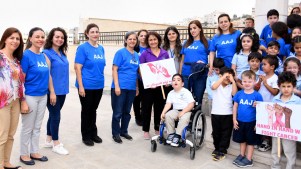Four months after becoming an interim bishop for a new Methodist denomination, John Pena Auta is heading home to Nigeria with an overwhelming assignment. He has to find the words to stop the spiral of violence that has left three people dead and nearly a dozen homes burned.
Two groups of Methodists clashed in the eastern village of Munga Dosso on Sunday, December 15, according to local news reports. Members of the Global Methodist Church (GMC) attempted to reopen one of three local church buildings that had been shuttered by the Taraba State Government during the schism that has divided Methodists around the world. Members of the United Methodist Church (UMC), who claim that the building is rightly theirs, tried to stop them.
In the ensuing conflict, 27-year-old Elisha Masoyi was shot dead. He has been identified as the brother of a UMC lay leader. Fire consumed 11 houses. One was the home of Abraham Kefas, director of a UMC school. Two of his children, ages 2 and 4, died in the fire.
Authorities detained 23 people but did not immediately file criminal charges, according to Nigerian news reports. Local UMC leaders said there was no question of who to blame.
“We are outraged,” UMC bishop John Schol wrote on Facebook. “We warned the GMC bishops of Nigeria that tensions were escalating because of the split within The United Methodist Church in Nigeria and to call GMC members in the midst of our differences to be peaceful and responsible. Yet it fell on deaf ears.”
Micah Dopah, director of the UMC’s connectional ministries in the region, called for Johnwesley Yohanna, a former bishop, and Auta, who was made bishop during the GMC’s first general conference in September, to be arrested.
“These leaders should be brought to book,” Dopah told The Daily Champion. “Let them be ready to face the wrath of the law, for their ungodly act in munga Dosso.”
Auta, who is originally from a rural area in Taraba and previously served as provost of the Methodist seminary about 20 miles from Munga Dosso, was in the US when the attack happened. He was speaking to Global Methodist churches in Georgia and Alabama about the work in Africa, his vision for the new denomination, and the importance of Christian unity.
“We are all called children of God, we’re called to love one another, and we are called to be one in Christ,” Auta told two ministers at Clearbranch Methodist in Trussville, Alabama, on their weekly podcast. “The Bible I read is the Bible you read. … The Bible unites us across the land, across the globe.”
Auta did not immediately respond to emails from Christianity Today but did issue a brief statement condemning the violence.
“Violence is not the best option of mitigating misunderstanding,” the statement said. “I pray God to heal those that are maimed and comfort those grieving with the everlasting peace of Jesus Christ our Savior.”
Some GMC leaders say the violence is really rooted not in Methodist divisions but in local conflicts that predate the church split. Nigerian ministers Simon Jatutu and Yayuba Baziel Yoila cited an ongoing “chieftaincy dispute.” Chris Ritter, a GMC pastor and blogger, reported that the fight can be traced to a rice harvest. GMC bishop Scott Jones mentioned a multigenerational feud.
“There is great uncertainty about the facts of what happened this past Sunday in Nigeria, and we are cautioning individuals to hold lightly the various versions and accusations that are being shared on social media,” Jones said in an email sent to church members. “What we do know is that this conflict is based in a long-standing family feud of over seven decades that has been heightened by the process of disaffiliation in Nigeria.”
Whatever the original source, the Methodist division in Nigeria has stirred up great animosity. The two sides disagree over the legitimacy of the division, who really broke from whom, and the numbers that are part of the new Methodist denominations. GMC leaders say they have 600,000 to 700,000 people, with more joining every day. UMC leaders claim that only 60,000 to 200,000 left in July and that many of them were deceived and returned to the UMC as soon as they realized what was happening.
The sides disagree over the Nigerian UMC’s relationship to homosexuality, which remains a criminal offense in the West African country. A UMC regional conference recondemned homosexuality in December, despite the approval of same-sex marriage and out LGBTQ clergy at the UMC’s general conference held in the US in May. African UMC leaders say GMC leaders are spreading “disinformation” and slandering the UMC as a “gay church.”
Nigerian Methodists are also fighting over property. The dispute includes individual church buildings, denominational assets including the Taraba Methodist headquarters, and a government license to operate in Nigeria. Property ownership is complicated by layers of legal rules, including colonial-era laws, common law, case law, and the Land Use Act of 1978, passed by the legislature, assigning states the responsibility to hold all land in trust for the people.
Some of the property disputes are going to court. Some have led to physical clashes. Police intervened in an altercation in the capital of Abuja after a pastor said his church would remain with the UMC.
“I have never seen such a thing before in my life,” one church member told local reporters. “The fight was so serious that when the police came they did not stop until they fired tear gas.”
There have been other physical conflicts as well. Absalom Nuhu, a Global Methodist minister in Abuja, said he has evidence of two GMC ministers and five GMC buildings being attacked, as well as several ministers’ homes and district meetings. Nuhu blames local UMC leaders.
“They instigate violence more than anyone else,” he wrote. “They are aggrieved, very angry at us. So they fight and accuse us of fighting them.”
The Taraba government closed all Methodist churches in August, citing the need to “prevent a breakdown of law and order.” An official ordered all church signs removed until the dispute was settled.
Both UMC and GMC leaders have been pushing the government to settle it so the churches could reopen by Christmas.
The conflict escalated to violence before that could happen. Now Auta, the newly minted bishop, is returning to Nigeria to try to intervene before any more people die.
“We urge the Church to pray fervently,” the GMC bishops said in a joint statement, “for those suffering unspeakable loss, for justice to be brought to those responsible for such violence, and for peace to be restored.”
The post Three Die in Nigerian Methodist Conflict appeared first on Christianity Today.



